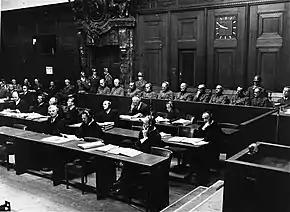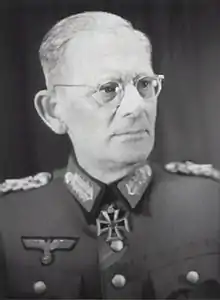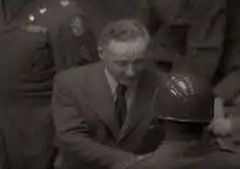Hostages Trial
The Hostages Trial (or, officially, The United States of America v. Wilhelm List, et al.) was held from 8 July 1947 until 19 February 1948 and was the seventh of the twelve trials for war crimes that United States authorities held in their occupation zone in Germany in Nuremberg after the end of World War II. These twelve trials were all held before US military courts, not before the International Military Tribunal, but took place in the same rooms at the Palace of Justice. The twelve US trials are collectively known as the "Subsequent Nuremberg Trials" or, more formally, as the "Trials of War Criminals before the Nuremberg Military Tribunals" (NMT).

This case is also known as the "Southeast Case" because all of the defendants had once been German generals leading the troops in Southeastern Europe during the Balkans Campaign, i.e. in Greece, Albania and Yugoslavia, and they were charged as those responsible for the hostage-taking of civilians and wanton shootings of these hostages and of "partisans" that the German troops committed there in the years in 1941 and later. The defendant Lothar Rendulic was further charged in respect of the 'scorched earth' total destruction of all towns, settlements and civil infrastructure in the Norwegian county of Finnmark in the winter of 1944.
The judges in this case, heard before Military Tribunal V, were Charles F. Wennerstrum (presiding judge) from Iowa, George J. Burke from Michigan, and Edward F. Carter from Nebraska. The Chief of Counsel for the Prosecution was Telford Taylor, the chief prosecutor for this case was Theodore Fenstermacher. The indictment was filed on May 10, 1947; the trial lasted from July 8, 1947 until February 19, 1948. Of the 12 defendants indicted, Franz Böhme committed suicide before the arraignment, and Maximilian von Weichs was severed from the trial for medical reasons. Of the remaining ten defendants, two were acquitted; the others received prison sentences ranging from seven years to lifetime imprisonment.
The judges were all from the American Midwest and represented a notably-different perspective on the Nuremberg trial proceedings from the East Coast judges who had presided over earlier trials in the series. In particular, the judges were much more sympathetic to the arguments of defense counsel, and inclined to treat the prosecution case with considerable suspicion. Following the judgement, Charles Wennerstrum gave an interview in which he accused the prosecution of failing "to maintain objectivity aloof from vindictiveness, [and] aloof from personal ambitions for convictions" and dismissed the whole Nuremberg exercise as "victors justice". He proposed that many of the German Jewish emigrants employed in the prosecution office were of suspect loyalty to the United States; "The whole atmosphere here is unwholesome.... Lawyers, clerks, interpreters and researchers are employed who became Americans only in recent years; whose backgrounds were embedded in Europe's hatreds and prejudices."
Indictment

The accused faced four charges of having committed war crimes and crimes against humanity:
- Mass murder of hundreds of thousands of civilians in Greece, Albania, and Yugoslavia by having ordered hostage taking and reprisal killings.
- Plundering and wanton destruction of villages and towns in Norway, Greece, Albania, Yugoslavia.
- Murder and ill-treatment of prisoners of war, and arbitrarily designating combatants as "partisans", denying them the status of prisoners of war, as well as their killing.
- Murder, torture, deportation, and sending to concentration camps of Greek, Albanian, and Yugoslav civilians.
All defendants were indicted on all counts and all pleaded "not guilty".
The tribunal had to deal with two pressing questions:
- Could partisans be "lawful belligerents" and thus entitled the status of prisoners of war; and was that status dependent on whether they wore uniform or distinctive military insignia?
- Could taking (and potentially killing) hostages, and other reprisals against civilians, be lawful as a "defense" against guerrilla attacks?
On the question of partisans, the tribunal concluded that under the current laws of war (the Hague Convention No. IV from 1907), the partisan fighters in southeast Europe could not be considered lawful belligerents under Article 1 of the convention even though most wore distinctive military insignia (a Red Star sewn onto a uniform cap) and many served in full uniform; as most fought as guerrillas and as such could not consistently conform to all the conditions of belligerency laid down in the Hague Regulations for regular forces, and consequently could be executed without trial.[1] Irregular forces who engaged in guerrilla warfare - even if they did so in uniform - could not be lawful combatants. On List, the tribunal stated:
We are obliged to hold that such guerrillas were francs tireurs who, upon capture, could be subjected to the death penalty. Consequently, no criminal responsibility attaches to the defendant List because of the execution of captured partisans...[1]
Regarding hostage taking, the tribunal came to the conclusion that under certain circumstances, hostage taking and even reprisal killings might constitute a lawful course of action against guerilla attacks. In the tribunal's opinion, taking hostages (and killing them in retaliation for guerilla attacks) could be legitimate subject to several conditions.[2] The tribunal also remarked that both the British Manual of Military Law and the U.S. Basic Field Manual (Rules of Land Warfare) permitted the taking of reprisals against a civilian population. (The British manual did not mention killing, but the US manual included killing as a possible reprisal.[3]) Nevertheless, the tribunal still found most of the accused guilty on count 1 of the indictment because it considered the acts committed by the German troops to be in excess of the rules under which the tribunal considered hostage taking and reprisal killings lawful; in particular that a clear connection between the hostages taken and guerrilla forces should have been established through some form of judicial process.
Notably, the tribunal refused to take any regard at all for the Nuremberg principles established previously in the Charter of the International Military Tribunal; where it had been stated at Article 6 that the killing of hostages was a war crime. "War crimes: namely, violations of the laws or customs of war. Such violations shall include, but not be limited to, murder, ill-treatment or deportation to slave labour or for any other purpose of civilian population of or in occupied territory, murder or ill-treatment of prisoners of war or persons on the seas, killing of hostages, plunder of public or private property, wanton destruction of cities, towns or villages, or devastation not justified by military necessity."
One common line of defense of the accused was the Plea of Superior Orders: they stated that they were only following orders from higher up, in particular from Hitler and Field Marshal Keitel. The tribunal recognized this defense only for some of the lower-ranked defendants, but concluded that in particular the highest-ranking officers, List and Kuntze, should have been well aware of the fact that these orders violated international law and thus should have opposed the execution of these orders, even more so as they were in a position that would have allowed them to do so.
Clarification of military occupation
The Tribunal considered the question of whether the Croatian state was a sovereign entity capable of acting independently of the German military (Germany recognised the Croatian government on 15 April 1941). It concluded that it was not and that military occupation depended not on the physical deployment of troops, as they could be redeployed into the territory at will, but on the control exercised by the occupying power. It followed that as the area remained under the control of the occupying power therefore "Logic and reason dictate that the occupant could not lawfully do indirectly that which it could not do directly".[4]
Defendants
| Portrait | Name | Function at time of offense | Charges | Sentence | |||
|---|---|---|---|---|---|---|---|
| 1 | 2 | 3 | 4 | ||||
 |
Wilhelm List | Field Marshal, Commander in Chief South-East 1941-1942, head of the German 12th Army in 1941 | G | I | G | I | lifetime imprisonment; released in December 1952 due to medical reasons. Died 1971 |
 |
Maximilian von Weichs | Field Marshal, commander of the German 2nd Army during the Balkans Campaign with the rank of a Generaloberst | I | I | I | I | Removed from the trial due to illness. Died 1954 |
 |
Lothar Rendulic | Generaloberst, Commander of the 2nd Panzer Army in Yugoslavia 1943-44; from 1944, Commander of the 20th Mountain Army and all German troops stationed in Finland and Norway | G | I | G | G | 20 years' imprisonment reduced to 10 years. Released 1951. Died 1971 |
.jpg.webp) |
Walter Kuntze | General der Pioniere, successor of List as Commander in Chief South-East and head of the 12th Army as of October 29, 1941 | G | I | G | G | lifetime imprisonment. Released 1953. Died 1960 |
| Hermann Foertsch | Generalmajor, Chief of Staff of the 12th Army | I | I | I | I | acquitted. Died 1961 | |
 |
Franz Böhme | General of the XVIII Mountain Corps (1940–43), successor of Rendulic in 1944 | I | I | I | I | Committed suicide on May 30, 1947 (before the arraignment). |
 |
Hellmuth Felmy | General der Flieger; commander in southern Greece | G | G | I | I | 15 years' imprisonment; reduced to 10 years in 1951. Died 1965 |
 |
Hubert Lanz | General of the XXII Mountain Corps (1943–45) | G | I | G | I | 12 years' imprisonment; released 1951. Died 1982. |
 |
Ernst Dehner | Generalmajor, corps commander under Rendulic | G | I | I | I | 7 years' imprisonment; released 1951. Died 1970 |
 |
Ernst von Leyser | General der Infanterie, corps commander under Rendulic and Böhme | I | I | G | G | 10 years' imprisonment; released 1951. Died 1962 |
| Wilhelm Speidel | Generalmajor, military commander in Greece 1942-44 | G | I | I | I | 20 years' imprisonment; released 1951. Died 1970 | |
| Kurt Ritter von Geitner | Generalmajor, Chief of Staff of the military commanders in Serbia and Greece | I | I | I | I | acquitted. Died 1968 | |
I — Indicted G — Indicted and found guilty
See also
| Wikimedia Commons has media related to Nuremberg Hostages Trial. |
References
- (WCC 1949): Law Reports of Trials of War Criminals, Vol. VIII, 1949 of the United Nations War Crimes Commission.
- Description from the U.S. Holocaust Memorial Museum.
- Another description
- Nuremberg Trial Transcript Collection
Footnotes
- The hostages trial, trial of Wilhelm List and others: Notes Archived 2005-02-08 at the Wayback Machine held at University of the West of England original source: United Nations War Crimes Commission. Law Reports of Trials of War Criminals. Volume VIII, 1949
- The law relating to hostages and reprisals Archived 2005-02-08 at the Wayback Machine held at University of the West of England original source: United Nations War Crimes Commission. Law Reports of Trials of War Criminals. Volume VIII, 1949
- Basic Field Manuel & Rules of Land Warfare paragraph 358.d, page 89
- Part IV: Legal status of the Croatian Government Archived 2005-02-08 at the Wayback Machine of the Hostage Trial